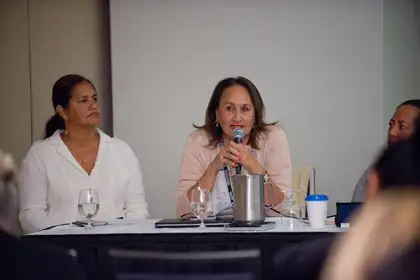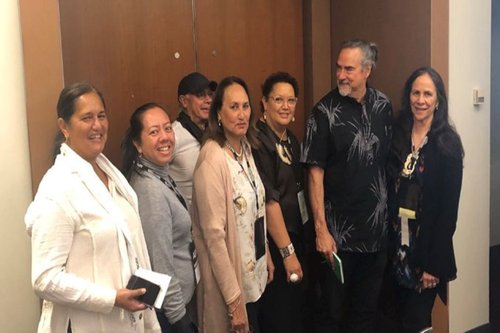
Being invited to speak at a presidential session is every bit as impressive as it sounds, when the session is hosted by the American Educational Research Association (AERA), at the world’s largest gathering of educational researchers.
Massey Professor of Māori Visual Arts, Bob Jahnke of the College of Creative Arts, and Professor Huia Jahnke of Te Pūtahi-a-Toi, School of Māori Knowledge, were invited to the AERA’s annual meeting of up to 15,000 delegates, this year held in Toronto, Canada. They co-presented a presidential session entitled “Indigenous Truths in Other People’s Democracies: Education Research in the Contested Spaces of the Pacific”
Along with leading indigenous academics from Hawai’i, the Massey Professors tackled questions around the impact of colonialism and democracy on Indigenous and Pacific nations and what role public education has played in stripping away the fundamental markers of indigenous identity - sovereignty, ancestral lands, language, and cultural knowledge? They were also able to discuss the contributions they have made towards ameliorating the effects of colonialism on Māori students.

Having established Massey’s Māori visual arts programme Toioho ki Āpiti, more than 20 years ago, Professor Jahnke was particularly qualified to discuss how the course has contributed to and encouraged Māori self-determination and unique self-expression.
Similarly, Professor Huia Jahnke’s work in developing Massey’s Te Aho Tātairangi, and postgraduate Te Aho Paerewa total immersion Māori medium teacher education programmes has created unique kaupapa Māori pathways that will have far reaching impact in Māori education.
Professor Huia Jahnke says the theme of the conference, ‘Leveraging Education Research in a Post-Truth Era: Multimodal Narratives to Democratise Evidence’, provided for challenging discussions. “A focus on indigenous truths in the context of neo-colonial democracies for example gave us the opportunity to raise questions regarding whose truth matters in the provision of indigenous centred programmes within the academy.”
Along with the Presidential Session, Professor Huia Jahnke also gave a paper entitled, ‘Whose truth matters: Reimagining indigeneity provision in higher education in Aotearoa’ and Professor Bob Jahnke also delivered a keynote speech ‘Pushing back against the Post-Truth paradigm’ using a kaupapa Māori framework to analyse what is Māori art.
Professor Huia Jahnke, who is the Co-Chair of AERA’s Indigenous Peoples of the Pacific Special Interest Group, says it’s gratifying to see the growing numbers of Māori and Pacific academics attending this important education research conference. Next year it will be held in San Francisco